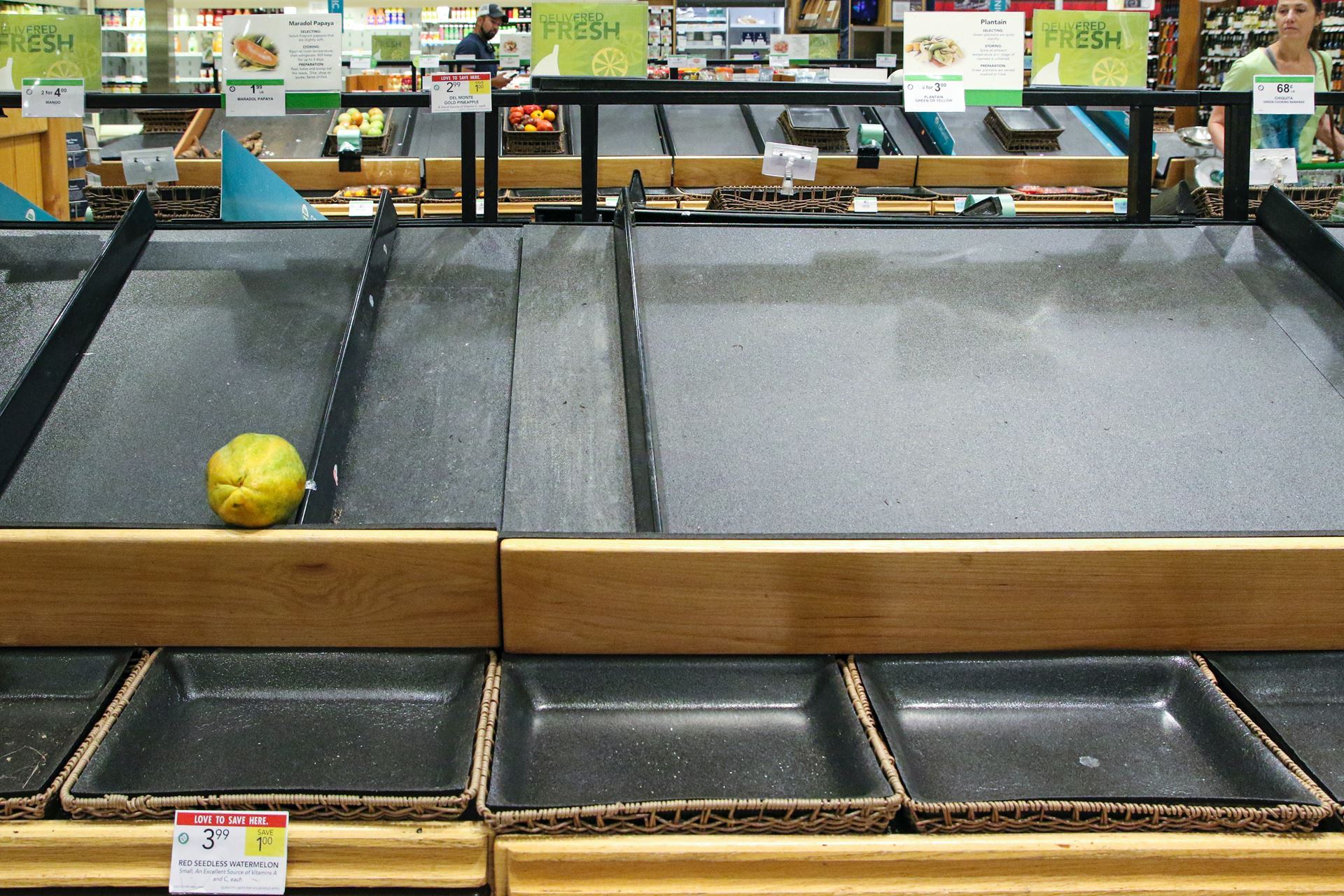
Picture of a grocery store with empty shelves in Florida due to the Coronavirus. Picture by Mick Haupt.
By now most Americans have seen images of long lines at food banks around the nation – thousands of cars bumper to bumper in Cleveland, San Antonio, Minneapolis, Pittsburg, and many other cities. The images are devastating. How could this happen? The question echoes across the nation, and certainly with urgent distress for those waiting in those thousand-car lines. How could this happen in our rich nation with the world’s most powerful economy and its most productive agricultural system? Why has the COVID-19 pandemic left so many Americans desperately short of food?
The answers are many: the administration’s clumsy reaction to the crisis, widespread job losses in the nation’s massive service sector due to tough “stay-at-home” edicts, fear and panic-hoarding, and politicization of responses to the crisis. Besides these obvious explanations, there are others that are less apparent and unlikely to get much coverage in the 24-hour news cycle, but perhaps more telling.
While the pandemic reveals government ineptitude, it also reveals the precariousness of other foundational systems. Healthcare, economics, the media, and education have all been staggered by the sudden eruption of this contagion. What is failing are the systems themselves – most dramatically, our food system.
In urban centers around America, grocery stores are facing shortages of basic commodities. There are empty spaces on shelves, and not just in the paper aisles but also in the food aisles. Food insecurity has increased, exacerbated by economic inequalities and driven even harder by the collapse of the service sector. Long and lengthening lines at foodbanks are leading to shortages there as well. Ironically, in the midst of this food crisis, farmers are plowing under crops, dumping milk and eggs, and laying off workers.
Why is this happening?
Those who have been researching America’s foodways have long been aware of the liabilities of the contemporary food system. As a culture, beginning in the 1950s, the industrial food system began a rapid conquest of America’s foodways. This system relies on inflexible structures of the consumerist economic order: long supply lines, with low wage jobs every step of the way; just-in-time inventory processes; enormous mono-crop farms that destroy whole ecosystems; giant food processing plants, stock yards, and slaughterhouses; and vast extractions of oil, water, and phosphates.
Every food product we consume travels an average of 1,500 miles from farm to table. We are all dependent on massive quantities of food making this 1,500 mile trek, relying on a rigid, complex system, over which local governments, businesses, and individuals have little control or authority. We are simply consumers, receiving only what the system delivers to us. If the system breaks down or even stumbles, there is little that can be done except ask for help, hope the mega-corporations and their complex system can retool quickly enough to avert catastrophe, or look to the federal government for assistance.
This is exactly what is happening today. The process is not working. The industrial food system is reacting slowly and with mixed results (watch for more shortages and significant cost increases in basic commodities), the federal government is stumbling into action, and local leaders are hoping for help feeding the food-insecure. But when it comes to food supplies, there is very little local leaders can do besides hoping and asking for help – because in most communities there does not exist a viable local food system. We are at the mercy of systems beyond our ken and out of our control.
The poor, the dispossessed, the marginalized, the homeless, and all others experiencing chronic food insecurity are facing grave challenges in this moment. They are now joined by countless others, millions nationwide, who likely never had a concern over food in their lives. As the coronavirus has highlighted the dramatic weaknesses and tragic inequalities in America’s healthcare system, its consequences may bring to national awareness the dangerous lack of resilience in the industrial food system upon which we have become dependent. Hopefully this will happen and prompt reform, but what would this reform look like?
What would reform look like?
The reform would have to begin with the recognition that what is happening now is not a fluke, it is also not nearly as serious as it could be. Image what would happen if more meat-packing plants shut down, if there was a sharp decline in the number of farmworkers harvesting crops, if climate change caused a collapse of grain production in the Midwest, if cheap transportation of food was no longer available, if we lost even more pollinators. Imagine what would happen if the federal government did not buy up surplus food from the industrial food system and facilitate its distribution. Imagine if the industrial food system found it more profitable to destroy surplus commodities rather than teaming with food-relief networks. Imagine a virus even more lethal than COVID-19.
Imagine what would happen if any of those possibilities occurred. Where would our food come from then? The industrial food system is too frail to withstand large-scale cultural traumas, and if reform does not occur, what is happening today will happen again, likely with more dire consequences. Reform is not impossible, and can begin today, taking many forms, with many options. It would have food banks also act as seed and seedling banks – offering seeds and seedlings along with basic food supplies. It would include community vegetable gardens as a part of every public park, and a line item for urban farms in every city’s budget. Cities would fund staff positions for agricultural directors and urban gardeners. Local governments would require that new developments include not only green space, but farm space as well.
Government at all levels would offer tax-incentives for replacing lawns and ornamental plantings with vegetable gardens, giving fruit trees to propriety owners, restoring agriculture classes in public schools – especially urban schools. It would include agriculture programs at every public university (not just the land-grant schools) and courses in horticulture as mandatory graduation requirements for all bachelor’s degrees. From pre-school through college, equal or greater stress would be put on learning gardening as is put on learning cyber systems today.
This is not an impossible vision. Not at all. If only a fraction of spending by the USDA, state and local governments, schools of higher education, charities, and emergency feeding organizations was diverted to reforms such as these, the food-crisis we face to today might never have occurred – and if we act now, it need never occur again.
Here are some articles for additional background reading on the impact of the pandemic on the food system:
The Coronavirus Reveals The ‘Invisible Inequalities’ In Our Food System, Huff Post
Farmers plowing under crops, dumping milk, New York Times
What the Coronavirus means for Food Insecurity, The Hill
Supply chains stressed, but are run by ‘incredible foragers,’ USF expert says, Tampa Bay Times
April saw the sharpest increase in grocery store prices in nearly 50 years, Boston Globe from The Washington Post
US grocery costs jump the most in 46 years, led by rising prices for meat and eggs, CNBC
The original Post can be found on the Ecology Florida website here.
 Dell deChant is the Associate Chair of the Department of Religious Studies at the University of South Florida. He is a Master Instructor and has served at USF since 1986. The author of three books, over 30 articles in professional publications, and chapters in twelve books, his specialization is religion and contemporary cultures. His current research focuses on religious, literary, and ecological expressions of Agrarianism as they manifest in American popular culture. He is Chair of the Environmental Committee of the City of New Port Richey, a founding member of Food Policy Council of Pasco Country, a member of the Florida Food Policy Council, and a member of the Board of Directors of Ecology Florida.
Dell deChant is the Associate Chair of the Department of Religious Studies at the University of South Florida. He is a Master Instructor and has served at USF since 1986. The author of three books, over 30 articles in professional publications, and chapters in twelve books, his specialization is religion and contemporary cultures. His current research focuses on religious, literary, and ecological expressions of Agrarianism as they manifest in American popular culture. He is Chair of the Environmental Committee of the City of New Port Richey, a founding member of Food Policy Council of Pasco Country, a member of the Florida Food Policy Council, and a member of the Board of Directors of Ecology Florida.